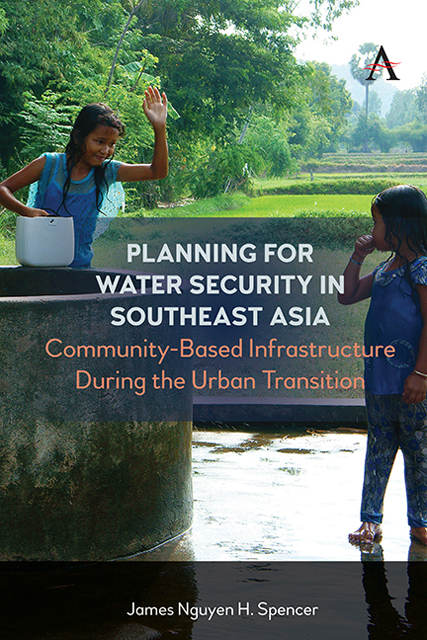 Planning for Water Security in Southeast Asia
Planning for Water Security in Southeast Asia Book contents
- Frontmatter
- Content
- Preface
- Introduction
- 1 Water and Human Security
- 2 Global Urbanization: The Confluence of Peri-Urbanization and Urban Transition
- 3 Community-Based Public Finance of Deep Well Water Systems in Peri-Urban Java
- 4 The Peri-Urbanization of Can Tho and the rise of Entrepreneurial Water Suppliers in the Mekong Delta
- 5 Ha Noi: Bulk Water Retailing in Peri-Urban Areas
- 6 Peri-Urbanization, Co-Production and Institutional Culture: The Case of the Phnom Penh Water Supply Authority
- 7 Beyond Resilience: Are we thinking about Entitlements, Participation and Governance in the Right Way?
- References
- Index
6 - Peri-Urbanization, Co-Production and Institutional Culture: The Case of the Phnom Penh Water Supply Authority
Published online by Cambridge University Press: 10 January 2023
- Frontmatter
- Content
- Preface
- Introduction
- 1 Water and Human Security
- 2 Global Urbanization: The Confluence of Peri-Urbanization and Urban Transition
- 3 Community-Based Public Finance of Deep Well Water Systems in Peri-Urban Java
- 4 The Peri-Urbanization of Can Tho and the rise of Entrepreneurial Water Suppliers in the Mekong Delta
- 5 Ha Noi: Bulk Water Retailing in Peri-Urban Areas
- 6 Peri-Urbanization, Co-Production and Institutional Culture: The Case of the Phnom Penh Water Supply Authority
- 7 Beyond Resilience: Are we thinking about Entitlements, Participation and Governance in the Right Way?
- References
- Index
Summary
Rapid urbanization is a daunting challenge for many governments in developing countries in Asia striving to provide basic needs such as safe drinking water and sanitation. As the provision of drinking water in the face of urban expansion has become a major planning and policy challenge in Cambodia, the country has had to rebuild effective local institutions after years of war. Unlike the other cases, Cambodian urbanization is not simply the growth of new secondary or primary cities and peri-urban expansion of functioning large cities. Rather, it is these processes combined with a complete reconstruction of formerly functioning institutions that were almost completely destroyed during a period in which a revolutionary government entirely emptied the country's cities in the name of building an agrarian utopia.
This chapter recounts the story of how one arm of government creatively responded to this huge challenge of urbanization during reconstruction. Beyond being an illustration of successful post-conflict reconstruction, the chapter emphasizes the need of formal institutions for informal and ad-hoc contributions; it describes the relationship between a municipal agency supplying water and urban poor communities in Phnom Penh, Cambodia. In doing so, it shows how good governance of infrastructure development and management can result from decision-making rooted in informal communities and processes, even under the most challenging of circumstances. Moreover, these strong ties to informal relationships may be precisely the reason why the system was so successful. Importantly, this story also bolsters the view that participatory infrastructure development recognizes a wide range of useful planners and regulators, including those from poor communities, who should not be considered merely passive recipients of development assistance. This latter point is an essential aspect of successful and democratic urbanization.
After years of civil war in the early 1990s, Cambodia began to focus on reconstruction and the development of its much-needed infrastructure across the country. While most government institutions at the capital/provincial levels were dysfunctional, the Phnom Penh Water Supply Authority (PPWSA) was able to provide excellent water service to most of the capital's residents, even to the extremely poor. This case represents a traditional utility that was able to creatively experiment with new management practices and to solicit community involvement in the administration of its work.
- Type
- Chapter
- Information
- Planning for Water Security in Southeast AsiaCommunity-Based Infrastructure During the Urban Transition, pp. 159 - 180Publisher: Anthem PressPrint publication year: 2022
